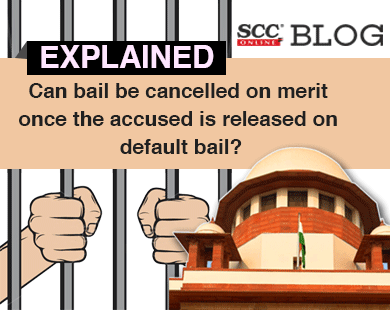Supreme Court: In a case where the Andhra Pradesh High Court had refused to cancel the default bail on the application of the Central Bureau of Investigation (C.B.I.) after observing that once the accused was released on default bail under Section 167(2) Cr.P.C., thereafter it was not permissible to consider the case for cancellation of bail on merits, the Bench of MR Shah* and CT Ravukumar, JJ has disapproved of this view and has held that there is no such absolute rule that such default bail cannot be cancelled on merits and can only be cancelled on other general grounds like tampering with the evidence/witnesses; not cooperating with the investigating agency and/or not cooperating with the concerned Trial Court etc.
The Court explained that while mere filing of the chargesheet subsequent to a person is released on default bail under Section 167(2) Cr.P.C. cannot be a ground to cancel the bail of a person, who is released on default bail, however, on filing of the chargesheet on conclusion of the investigation, if a strong case is made out and on merits, it is found that he has committed a non-bailable offence/crime, on the special reasons/grounds and considering Section 437(5) and Section 439(2) Cr.P.C, over and above other grounds on which the bail to a person, who is released on bail can be cancelled on merits.
It was observed that
“If the view that once an accused is released on default bail under Section 167(2) Cr.P.C., his bail cannot be cancelled on merits is accepted, in that case, it will be giving a premium to the lethargic and/or negligence, may be in a given case of deliberate attempt on the part of the investigating agency not to file the chargesheet within the prescribed time period.”
The Court further explained that in a given case, even if the accused has committed a very serious offence, may be under the NDPS or even committed murder(s), still however, he manages through a convenient investigating officer and he manages not to file the chargesheet within the prescribed time limit mentioned under Section 167(2) Cr.P.C. and got released on default bail, it may lead to giving a premium to illegality and/or dishonesty. Such release of the accused on default bail is not on merits at all, and is on the eventuality occurring in proviso to sub-section (2) of Section 167. However, subsequently on curing the defects and filing the chargesheet, though a strong case is made out that an accused has committed the very serious offence and non-bailable crime, the Court cannot cancel the bail and commit the person into custody and not to consider the gravity of the offence committed by the accused, the Courts will be loathe for such an interpretation, as that would frustrate the justice.
“The Courts have the power to cancel the bail and to examine the merits of the case in a case where the accused is released on default bail and released not on merits earlier. Such an interpretation would be in furtherance to the administration of justice.”
Hence, in a case where an accused is released on default bail under Section 167(2) Cr.P.C., and thereafter on filing of the chargesheet, a strong case is made out and on special reasons being made out from the chargesheet that the accused has committed a non-bailable crime and considering the grounds set out in Sections 437(5) and Section 439(2), his bail can be cancelled on merits and the Courts are not precluded from considering the application for cancelation of the bail on merits.
The ruling came in the case relating to the brutal murder of Y.S. Vivekananda Reddy. Reddy, a former M.L.A.; former Member of Lok Sabha; former Member of A.P. Legislative Council; and holding other posts, was found dead in his house on 15.03.2019. One of the accused T. Gangi Reddy, was granted default bail after the lapse of statutory period of 90 days from his arrest.
While initially a Special Investigation team was looking into matter, once the CBI took charge, its investigation revealed that a conspiracy was hatched up by 4 accused, including the respondent herein, along with some other persons to kill the deceased and there were some influenced persons behind the said conspiracy. However, CBI’s plea for cancellation of bail was rejected.
The Supreme Court, however, noticed that the High Court did not at all considered on merits the application for cancellation of the bail, and hence, remitted the matter to the High Court for considering the application afresh.
[State v. T. Gangi Reddy, 2023 SCC OnLine SC 25, decided on 16.01.2023]
*Judgment authored by: Justice MR Shah
Counsels
For CBI: ASG K.M. Nataraj
For respondents: Senion Advocate B. Adinarayana Rao
Also read






